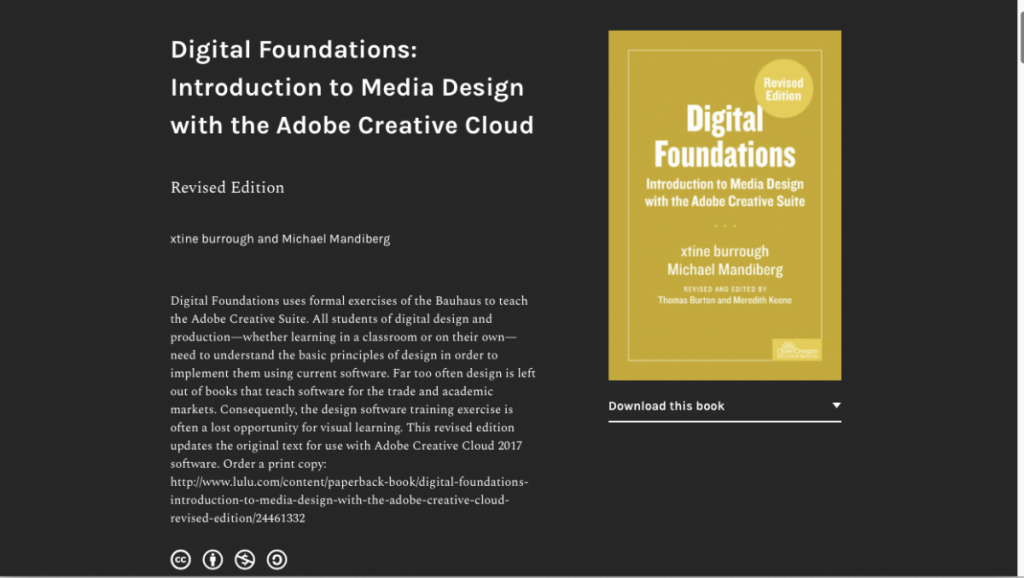Course Overview
This course introduces students to core concepts in the graphic communications field including typography, color theory, design and production terminology, reproduction processes, file formats and substrates. During the semester, students will complete three pages of their own ePortfolio web site. Lectures will provide students with a historical perspective of the graphic communications field as well as discussing current practices and future trends.
• Gain an awareness of the media industry and the design community by exploring industry and association web sites and by attending one field trip
Credits, Hours
3 Credits, 4 hours (3 lecture, 1 lab)
Section
D016
Course Site
https://openlab.citytech.cuny.edu/shrikycomd1112fa22/
Course Syllabus
Below is the course Syllabus as a PDF File:
Course Objectives
• Describe and explain the differences among key file formats for digital images, digital video, audio and print output.
• Demonstrate the ability to apply technical understanding of color space and color management to the production of design project files and the posting of images on the Openlab
• Hone research skills by using the library’s electronic databases to find articles and information related to the industry
• Demonstrate descriptive and analytic verbal and writing skills by preparing one field trip report, one research report and partici- pating in classroom critiques/discussions
• Understand the differences between proprietary and open source software tools and formats and understand the importance of using industry standards
• Understand the production stages of a project: pre-production, production and post-production
General Education Goals
• Thinking Critically: Through projects in this class, you will improve your ability to analyze and synthesize information.
• Writing: This is a writing intensive class and you will develop the writing skills required of a design professional.
• Academic and Professional Reading: Throughout the class, we will be reading industry specific publications.
• Information Literacy: In the required research report, you will formulate relevant queries using appropriate industry sources.
A sample syllabus of this class is attached below as a PDF.
The required textbook for this class is Digital Foundations, Introduction to Media Design with the Adobe Creative Cloud, Revised Edison,Edition; (Publisher: Oregon Open Educational Resources , @ 2017). It is available for free in PDF, EPub, online at https://www.openoregon.pressbooks.pub/foundations.

There will also be other readings from other industry publications and text listing under your assignments for each week. See the Resources section of our site. for references on writing and design research.
Netiquette
Learning is a group activity. The behavior of each person in class affects the overall learning environment. As a COMD student you are expected to act in a professional manner; to be respectful of the learning process, your instructor, and your fellow students. And hopefully have fun!
- Learning on the OpenLab
- OpenLab Community Guidelines
- Netiquette Guide (CUNY School of Professional Studies)
Attendance Policy
Attendance is taken and is important to success in this class. Both absences and arrival more than 15 minutes after the start of class will be marked. If excessive, the instructor will alert the student that they may be in danger of not meeting the course objectives and participation expectations, which could lead to a lower or failing grade.
Academic Integrity
Students and all others who work with information, ideas, texts, images, music, inventions and other intellectual property owe their audience and sources accuracy and honesty in using, crediting and citation of sources. As a community of intellectual and professional workers, the college recognizes its responsibility for providing instruction in information literacy and academic integrity, offering models of good practice, and responding vigilantly and appropriately to infractions of academic integrity. Accordingly, academic dishonesty is prohibited in The City University of New York and is punishable by penalties, including failing grades, suspension and expulsion. More information about the College’s policy on Academic Integrity may be found in the College Catalog.
Print this page



Recent Comments